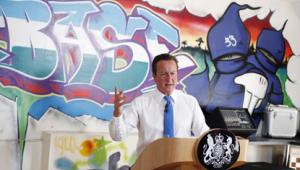In a report published today, which assessed the progress the government has made toward planning for Britain’s exit from the European Union.
It concluded that while Whitehall had indeed built some of the structures necessary to begin the process, ministers “didn’t know how to use them”, and time was being wasted due to turf wars and political squabbles.
Alternatively, the report suggested, ministers were aware of a strategy, but were keeping quiet about it. Whichever of these was true, the IfG said, “silence is not a strategy”.
Prime minister Theresa May has hitherto been tightlipped about plans for managing Brexit. Liam Fox, the international trade secretary, was criticised by many yesterday after his speech at the World Trade Organization on the topic contained little in the way of detail.
In the report, the IfG said that, although the government moved quickly after the referendum, there was now a “gaping void” of information about how it intended to reach a negotiating position with the rest of the EU. Britain will need to engage in tough discussions with other European politicians to decide on the exit terms, and its relationship with the bloc in the years to come.
Two new departments have been created to deliver Brexit alongside the Foreign Office. The Department for Exiting the EU is headed up by David Davis, while the Department for International Trade is led by Liam Fox. Davis is charged with coordinating policy between other departments while negotiating Brexit, while Fox is focused on developing the UK’s new aid strategy outside of the bloc.
According to the IfG, DExEU is likely to need around 320 staff, while DIT will probably need an additional 200. This is the extra labour force needed simply to plan for the exit. More are likely to be required to undertake negotiations and deal with the consequences of leaving, it said.
Moreover, since three departments were now working in a similar area, the IfG warned this “triple departmental structure risks creating fragmentation and incoherence”. It added that this was likely to have caused distractions and delayed work on Brexit.
Hannah White, programme director and co-author of the report, urged government to quickly dispel doubt regarding the process.
She said: “The current situation – where we are left to interpret the personal musings of individual ministers – is frustrating those looking for an early exit, perplexing those with whom we have to negotiate and unsettling those looking to do business with the UK.”
White recognised that May has previously said she would not give a running commentary on negotiations. However, she said the prime minister rapidly needed “to clarify how and when the government intends to go about making decisions on Brexit”.
Jill Rutter, co-author, and also a programme director at IfG, stressed that the difficult choices involved in shaping the Brexit were “too important to be left to normal interdepartmental wrangling and horse-trading”,
She urged government and particularly DExEU to ensure ministers could make those critical choices based on “the best shared analysis the civil service can produce”.











